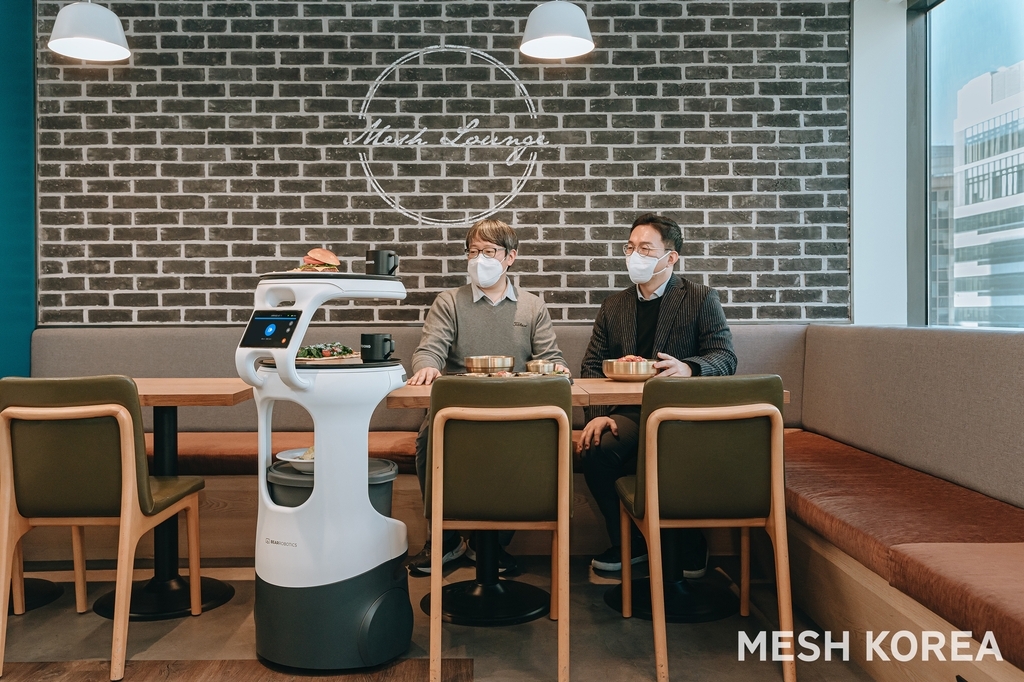Korean retailers expand delivery service with robots, drones
Robots to cover delivery services to high-rise apartments to lessen human couriers’ physical burden, protect customer privacy
By Byun Hye-jinPublished : Feb. 9, 2022 - 15:44

Retail companies in South Korea are taking the plunge into last-mile mobility technology by launching service robots and drones to provide contactless services sparked by the coronavirus pandemic.
To meet the high demand for delivery and dining services, Mesh Korea, the operator of tech-based logistics startup Vroong, said Wednesday it has partnered up with Bear Robotics Korea, the Korean branch of a US-based robot manufacturing company, to introduce unmanned automated transport service to the Korean market.
According to the company, it will use service robots in areas such as high-rise apartments and residential blocks where motorcycles are banned from entering.
“Couriers tend to avoid such hard-to-reach places since it takes a long time to deliver packages. But with service robots, we expect to increase the efficiency of our delivery services,” said a Mesh Korea official.
For instance, self-driving delivery robots can be deployed to the higher floors of 20- to 30-story buildings while delivery workers can cover the lower floors, the official added.
“Also, there has been an issue of infringement of personal privacy since couriers have access to codes for entering apartment lobbies in order to deliver packages at their front doors. But we can minimize such problems by using delivery robots,” the official said.
The convenience store chain 7-Eleven is one of the retailers expanding customer services in use of robots and drones.
It has deployed three self-driving robots at Seocho I Park, an apartment complex in Gangnam district, southern Seoul, to deliver products to customers living within a 300-meter range. Customers can place an order through a mobile application, a 7-Eleven official said. The delivery robot drives at 7.2 kilometers per hour and can carry up to 25 kilograms of store items, the official added.
It also plans to expand delivery service in the air by forging a partnership with logistics solution startup Pablo Air.
“We plan to open up a new store with a drone station in the suburban area of Gyeonggi Province by March or April. Our key customers would be those in camping sites and tourist pensions. We will also expand our drone delivery services to customers living in far islands,” the official said.
GS25, the convenience store chain run by GS Retail, has also recently completed the pilot test of self-driving delivery robots in Gangseo-gu, western Seoul, and Gangnam-gu.
“After finishing the stabilization process of robot delivery, we plan to expand the service robot business in Seoul and to other cities,” said a GS Retail official.
Market insiders say the COVID-19 pandemic has indeed accelerated the introduction of auto mobility in retail, however, the government needs to further ease regulations on the areas where service robots are allowed to enter.
“Although the government has relaxed regulations on self-driving robots to pass by crosswalks, retailers need more room to expand its auto-mobility services to enhance customer experience,” an industry source said.




















![[Today’s K-pop] BTS pop-up event to come to Seoul](http://res.heraldm.com/phpwas/restmb_idxmake.php?idx=642&simg=/content/image/2024/04/17/20240417050734_0.jpg&u=)